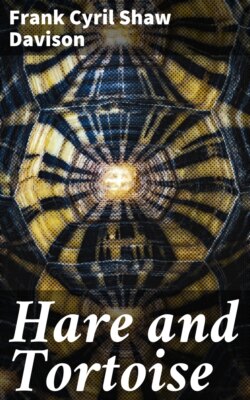Читать книгу Hare and Tortoise - Frank Cyril Shaw Davison - Страница 9
На сайте Литреса книга снята с продажи.
3
ОглавлениеTable of Contents
During several days Louise’s thoughtful, suddenly grown-up mood persisted, but it was destined to be violently detracked by the chance reading of a poem which had been marked in blue pencil and cut out, apparently, from the page of a magazine. It was lying on Keble’s table, among other papers. It was unsigned, and the title was Constancy. With a sense of wonderment that grew into fear she read:
You cry I’ve not been true,
Why should I be?
For, being true to you,
Who are but one part of an infinite me,
Should I not slight the rest?
Rather are you false to me and nature
In seeking to prolong the span
Of impulses born mortal;
In prisoning memories
Impalpable as the fluttering of wings.
If I’d been false,
I have but mounted higher
Toward a spacious summit,
Bourne of all soaring vows.
The buds we gathered in the vale have perished.
Branches that offered roofs of shimmering green motley,
Their summer service rendered,
Divested themselves,
Framing rude necessary heights.
Yet you sit plaintive there while I aspire,
Intent upon a goal you will not see.
Must I descend to you?
Or shall I venture still?—My staff
An accusation of inconstancy.
What did it mean? Why was it marked? Who had written it? Why was it lying on Keble’s desk? She stood cold and still, her gaze returning again and again to the paper in her hand.
Unable to answer the questions, she sat down and made an ink copy of the brutal lines. When the last word was written she replaced the original on the table and took the copy to her bedroom, reading it, unconsciously memorizing it, making room in her philosophy for its egoistic claim, and finally locking it in the box that sheltered her youthful manuscripts.
Although she did not refer to the enigmatic poem, she knew that to its discovery could be traced a breach that began to make itself felt, a breach which she knew Keble associated in some vague way with the funeral of little Billy Salter. Keble, for his part, had made no mention of the poem, and day after day those accusatory blue marks continued to peer through the unanswered correspondence that rested on his table. Although she argued the lines out of countenance, though she watched for Keble’s polite mask to fall and reveal some emotion that would disprove her interpretation of them, they ate into her heart.
The poem might have been a hint from Providence. She was an impediment to Keble’s progress, a poor creature unable to comprehend the hereditary urges that bore him along in a direction that seemed to her futile. How often must he have been legitimately impatient of her deficiencies! How often must he have starved for the internationally flavored chit-chat with which a wife like Girlie Windrom would have entertained him! With what a bitter sigh must he have read his thought thus expressed by an unknown poet! That would account for the marking and the clipping. She promised herself to profit by the hint, if hint it were.
As the breach widened, Keble maintained the deferential attitude he had always assumed in the course of their hitherto negligible misunderstandings. Technically he was always in the right. Her acquaintance with people of his class had been large enough to teach her that good breeding implied the maintenance of a certain tone, that in divergences of view between well and dubiously bred people, the moral advantage seemed always to lie with the former. It was a trick she had yet to learn.
There was a sort of finality in the nature of this breach that made it unlike any other in their relationship. This was a conclusion she admitted after days of desperate clinging to the illusion that nothing was amiss. Meanwhile Keble waited; and she sank deeper into silence.
In the midst of her self-analysis a letter arrived for Keble from the friend of the early spring. Walter Windrom had spent the intervening months in England, but was returning to his post in Washington.
The renewal of this link with the outer world had a stimulating effect upon Louise. It suggested a plan which ran through her veins like a tonic.
That night, through a blur of tears, she wrote the following letter, while her husband lay uneasily asleep.
“Hillside, September 16.
“Dear Walter: Before leaving the ranch you offered to do something for me. You may if you will. I’ve been miserable for months at the thought of what a very back-woods creature I am. I can never be what I would like to be; therefore I’ve decided to be what I can be, so hard that I shall be even with Fate. I can’t go away, but I can afford a tutor with my very own money. So will you please immediately pick out the most suitable girl you can find. Above all things she mustn’t be a teacher, or anything professional; she must simply be somebody nice, and too well-bred for words! I’ll learn by ear; I never could learn any other way.
“I will pay all expenses and whatever salary you suggest. And I’d rather it be a big salary for a paragon than economize on a second-best. She could come here as a former friend of mine, for Keble must know nothing about my conspiracy. Do you think that is too much like not playing the game? After all, it’s only that I wish to play the game better,—I mean his sort of game. Not that I especially like it; but I’ve let myself in for it.
“Would you do that, Walter, please, without making fun of me? Address me in care of Dr. Achille Bruneau.”
